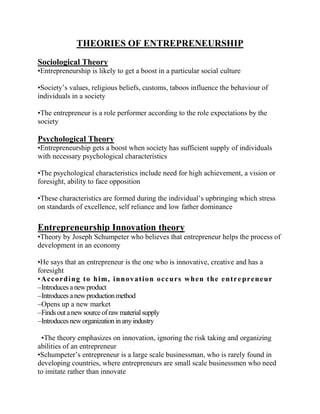Report
Share

Recommended
Recommended
More Related Content
What's hot
What's hot (20)
Viewers also liked
Viewers also liked (10)
Workshop: Value Chains - An introduction to value chains

Workshop: Value Chains - An introduction to value chains
1 entreprenuership-chapter-1-the-nature-&-importance-of-entreprenurs

1 entreprenuership-chapter-1-the-nature-&-importance-of-entreprenurs
Similar to Theories of entrepreneurship
Similar to Theories of entrepreneurship (20)
Economic and Psychological theories of Entrepreneurial motivation

Economic and Psychological theories of Entrepreneurial motivation
Unit 1- Introduction to Entrepreneurship (BOCS,BOET-505D).pdf

Unit 1- Introduction to Entrepreneurship (BOCS,BOET-505D).pdf
Unit 1- Introduction to Entrepreneurship (BOCS,BOET-505D).pdf

Unit 1- Introduction to Entrepreneurship (BOCS,BOET-505D).pdf
lecture1entrepreneurship-140316130141-phpapp02.pptx

lecture1entrepreneurship-140316130141-phpapp02.pptx
lecture1entrepreneurship-140316130141-phpapp02 (1).pdf

lecture1entrepreneurship-140316130141-phpapp02 (1).pdf
Theories of entrepreneurship
- 1. THEORIES OF ENTREPRENEURSHIP Sociological Theory •Entrepreneurship is likely to get a boost in a particular social culture •Society’s values, religious beliefs, customs, taboos influence the behaviour of individuals in a society •The entrepreneur is a role performer according to the role expectations by the society Psychological Theory •Entrepreneurship gets a boost when society has sufficient supply of individuals with necessary psychological characteristics •The psychological characteristics include need for high achievement, a vision or foresight, ability to face opposition •These characteristics are formed during the individual’s upbringing which stress on standards of excellence, self reliance and low father dominance Entrepreneurship Innovation theory •Theory by Joseph Schumpeter who believes that entrepreneur helps the process of development in an economy •He says that an entrepreneur is the one who is innovative, creative and has a foresight • Ac c o r d i n g t o h i m, i n n o v a t i o n o c c u r s w h e n t h e e n t r e p r e n e u r –Introduces a new product –Introduces a new production method –Opens up a new market –Finds out a new source of raw material supply –Introduces new organization in any industry •The theory emphasizes on innovation, ignoring the risk taking and organizing abilities of an entrepreneur •Schumpeter’s entrepreneur is a large scale businessman, who is rarely found in developing countries, where entrepreneurs are small scale businessmen who need to imitate rather than innovate
- 2. Theory of High Achievement/Theory of Achievement Motivation •McClelland identified 2 characteristics of entrepreneurship –Doing things in a new and better way –Decision making under uncertainty • He s t r e s s e d t h a t p e o p l e wi t h h i g h a c h i e v e me n t o r i e n t a t i o n ( n e e d to succeed) were more likely to become entrepreneurs •Such people are not influenced by money or external incentives •They consider profit to be a measure of success and competency Motivation theory by McClelland (Acquired Needs theory) •According to McClelland, a person has three types of needs at any given time, which are: –Need for achievement (get success with one’s own efforts) –Need for power (to dominate, influence others) –Need for affiliation (maintain friendly relations with others) •The need for achievement is the highest for entrepreneurs
